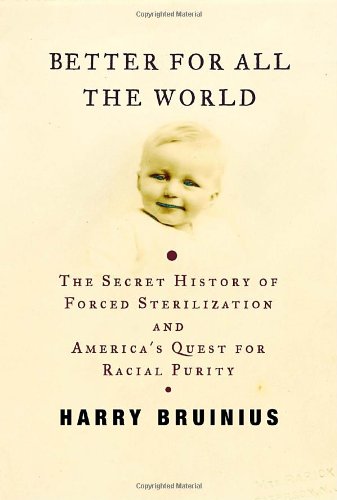Better for All the World: The Secret History of Forced Sterilization and America's Quest for Racial Purity
Bruinius, Harry
About the Book
Description:
New. Seller Inventory # Wizard0375413715
About this title:
Synopsis: In Better for All the World, Harry Bruinius charts the little-known history of eugenics in America—a movement that began in the early twentieth century and resulted in the forced sterilization of more than 65,000 Americans.
Bruinius tells the stories of Emma and Carrie Buck, two women trapped in poverty and caught up in a new scientific quest for racial purity. Buck v. Bell became a test case brought before the Supreme Court, which voted 8–1 to make sterilization a constitutionally valid way for the state to prevent anyone deemed “unfit” from having children.
The court’s majority opinion was written by Oliver Wendell Holmes: “It is better for all the world,” Holmes wrote, “if instead of waiting to execute degenerate offspring for crime, or to let them starve for their imbecility, society can prevent those who are manifestly unfit from continuing their kind. The principle that sustains compulsory vaccination is broad enough to cover cutting the Fallopian tubes. . . . Three generations of imbeciles are enough.”
Eugenicists believed that the human race must begin to take control not just of human reproduction, but of ethnic intermingling. With the natural and objective methods of science they hoped to breed only the biologically best of the races and prevent the propagation of the worst. The result: marriage restriction, anti-miscegenation, and immigration laws.
In Better for All the World, Harry Bruinius shows how reformers across the nation transformed haphazard, locally run systems of charity and welfare—mostly church handouts and town asylums—into government-run systems of welfare that aspired to make America a place where social and moral purity could reign, free from the “hereditary defectives” of the past.
Those who supported the programs included Theodore Roosevelt; Margaret Sanger; Alexander Graham Bell; the heads of the Harriman, Carnegie, and Rockefeller foundations; and scholars from Harvard, Yale, and Stanford.
Bruinius writes how many of the leaders of the eugenics movement were New England Protestants who used an evangelical tone that harked back to their Puritan forebears, and who proclaimed their goal to keep the “American stock” pure by excising the causes of immoral behavior.
Drawing on personal letters, diaries, and documents never before used, the author writes of the three scientists who developed the theories and practices of eugenics: Francis Galton, cousin of Charles Darwin, who coined the word “eugenics” to describe the science of better breeding; Charles Davenport, the first influential eugenic thinker in America, professor at Harvard University and the University of Chicago, direct descendant of Reverend John Davenport, the founder of the city of New Haven; and Harry Laughlin, Davenport’s protégé, the nation’s foremost expert in eugenic sterilization and also a leader in the movement to stop the tide of immigrants coming to this country.
The author makes clear how America’s quest for racial purity influenced Nazi Germany: one of its first laws, the Prevention of Genetically Diseased Offspring, followed the work of California’s Human Betterment Foundation and Harry Laughlin’s Model Law. In less than two years, more than 150,000 German citizens were sterilized, preparing the way for the genocide to come. In 1936, the Nazi regime awarded Laughlin an honorary doctorate from Heidelberg University for his contributions to “racial hygiene.” During the Nuremberg Trials, the Allied prosecutors were doubtful they could convict Nazi doctors of “crimes against humanity”—since those accused had carried out acts based on theories of eugenics that had been practiced for decades in the United States.
About the Author: Harry Bruinius was born in Chicago and attended Yale University, where he studied theology, and Columbia University, where he studied journalism. He is a frequent contributor to The Christian Science Monitor, a professor of journalism at Hunter College, and the founder of The Village Quill. He lives in Manhattan.
Bibliographic Details
Title: Better for All the World: The Secret History...
Publisher: Alfred A. Knopf
Publication Date: 2006
Binding: Hardcover
Condition: new
